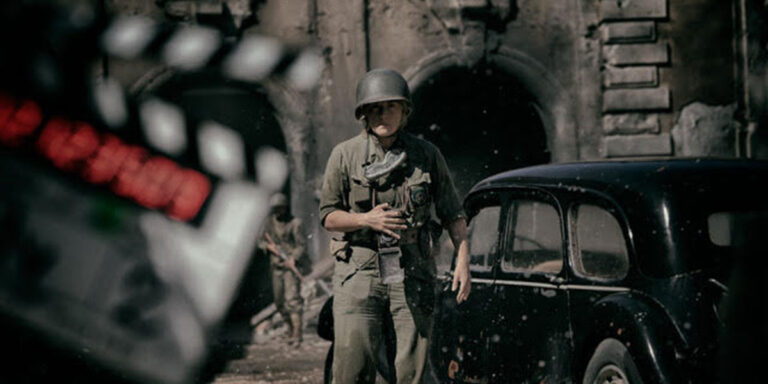Lee (2023 | UK | 116 minutes | Ellen Kuras)
In the title role of Lee Miller, Kate Winslet embodies the humanity of a pioneering photographer who was driven to bravely document the front lines of World War II. When the film opens, it’s 1938 and she’s a former model living the life of a bon vivant in the South of France where she spends her days gossiping with a coterie of likeminded artists. She falls in love with a gallerist (Alexander Skarsgård) whom she follows back to London as the war closes in on France and the Blitz befalls England. It’s back there, in the dark thicket of the war that she turns her role at Vogue (where she works with an tough-minded editor/advocate played by Andrea Riseborough) into an assignment covering the ongoing war. At first, she’s relegated to documenting the gruesome details of soldiers on medical bases. Eventually, though, she leverages her position into one that takes her into the dangerous heart of combat photojournalism.
The story is framed as an interview between a young man (Josh O’Connor) and an older recalcitrant Lee, still drinking and smoking well into her retirement. Much of the first half plays as a straight-ahead biopic of an admittedly fascinating subject whose work went largely unseen or appreciated in her own time.
It’s toward the back half, though, that Winslet really gets to cook and flex her acting chops. Along with a surprisingly terrific Andy Samberg as a friend and fellow photographer from Life magazine, they’re among the first journalists to photograph the gruesome aftermath of the war in Europe. First in the liberation of Paris. It’s there amidst the rubble that they reunite with friends who stayed behind (Marion Cotillard and Noémie Merlant, making the most of small supporting roles) and appreciate the personal toll of life under occupation. Later, we follow them far behind enemy lines where they’re among the first to document the gruesome yet-untold horrors of the concentration camps.
Crossing over from cinematographer (most famously for Eternal Sunshine of the Spotless Mind), Kuras makes an assured debut as a director, recreating historical settings, capturing the bleak flat light of war, and conveying the ever-present dangers of being in the field. Her shots from the climax, of the camps and abandoned officer apartments are impossible to forget. The film took a circuitous route from its Toronto premiere to theatrical release; so it’s an odd quirk of timing that Lee is on screens well after Alex Garland’s Civil War featured a character directly name checking its heroine. While both capture the harrowing nature of documenting an ongoing conflict, there is far more moral clarity here, but only in part because of the perspective of time.
Director Ellen Kuras portrays the challenges of being a woman in dangerous territory, but also the subtle ways that Miller’s unique perspective and gender informed her work. It’s a sober historical recollection, enlivened by powerful performances that convey the tenacity of reporters and the deep emotional toll taken by those who bear witness to atrocities.
An earlier version of this review ran when Lee had its world premiere at the 2023 Toronto International Film Festival. It is now playing in area theaters.




